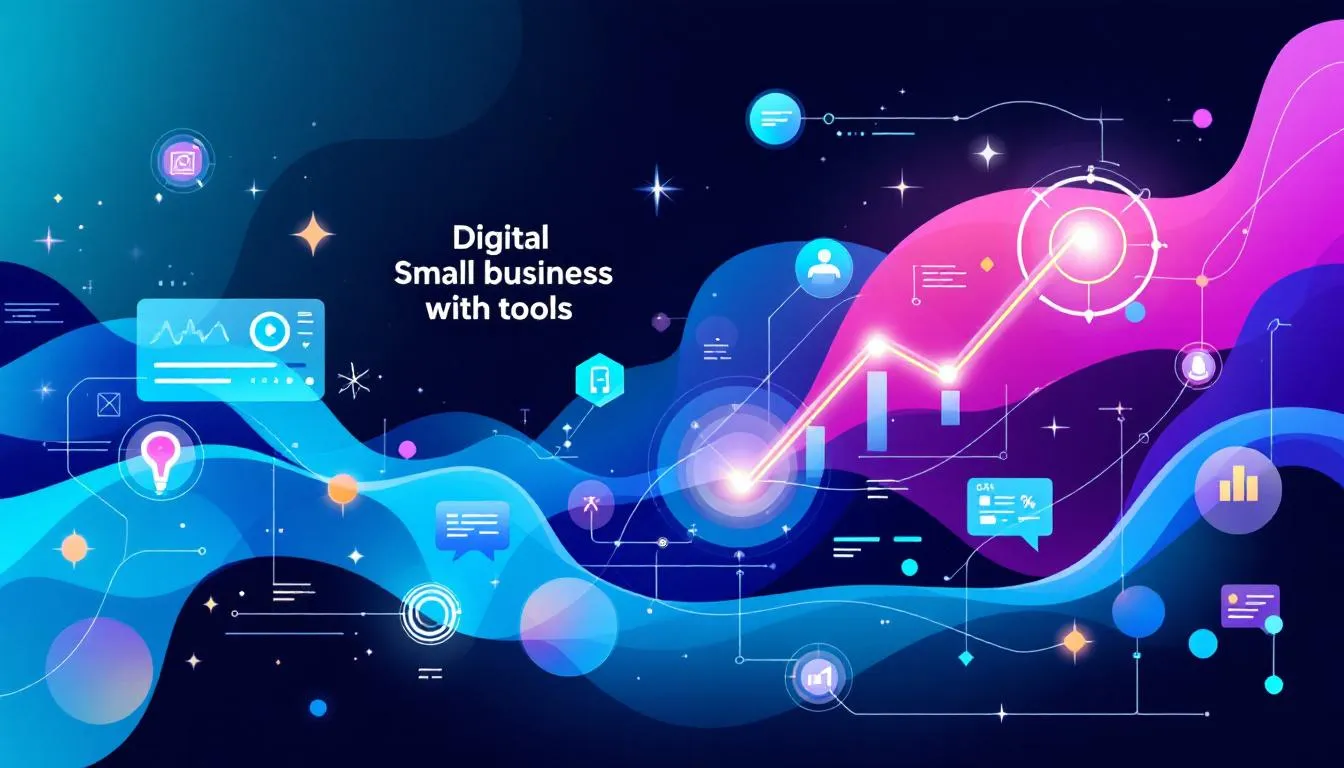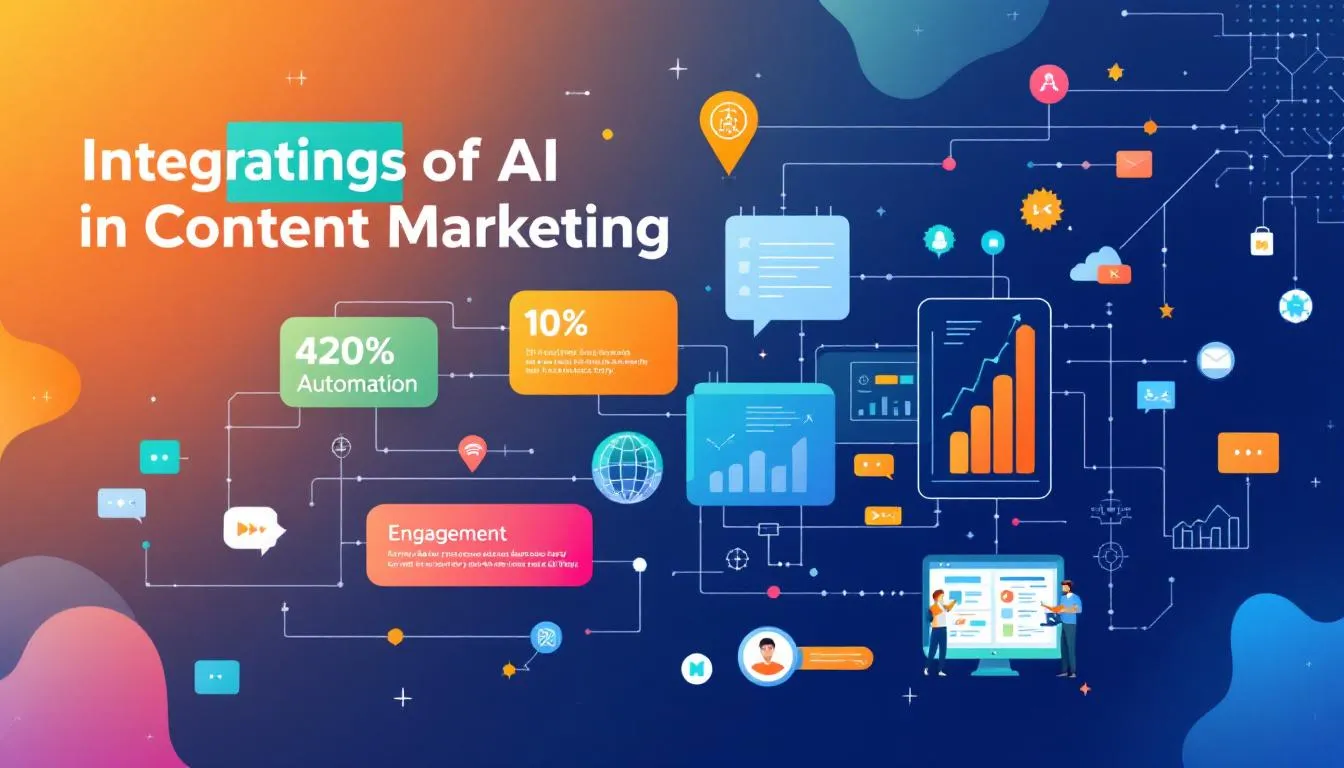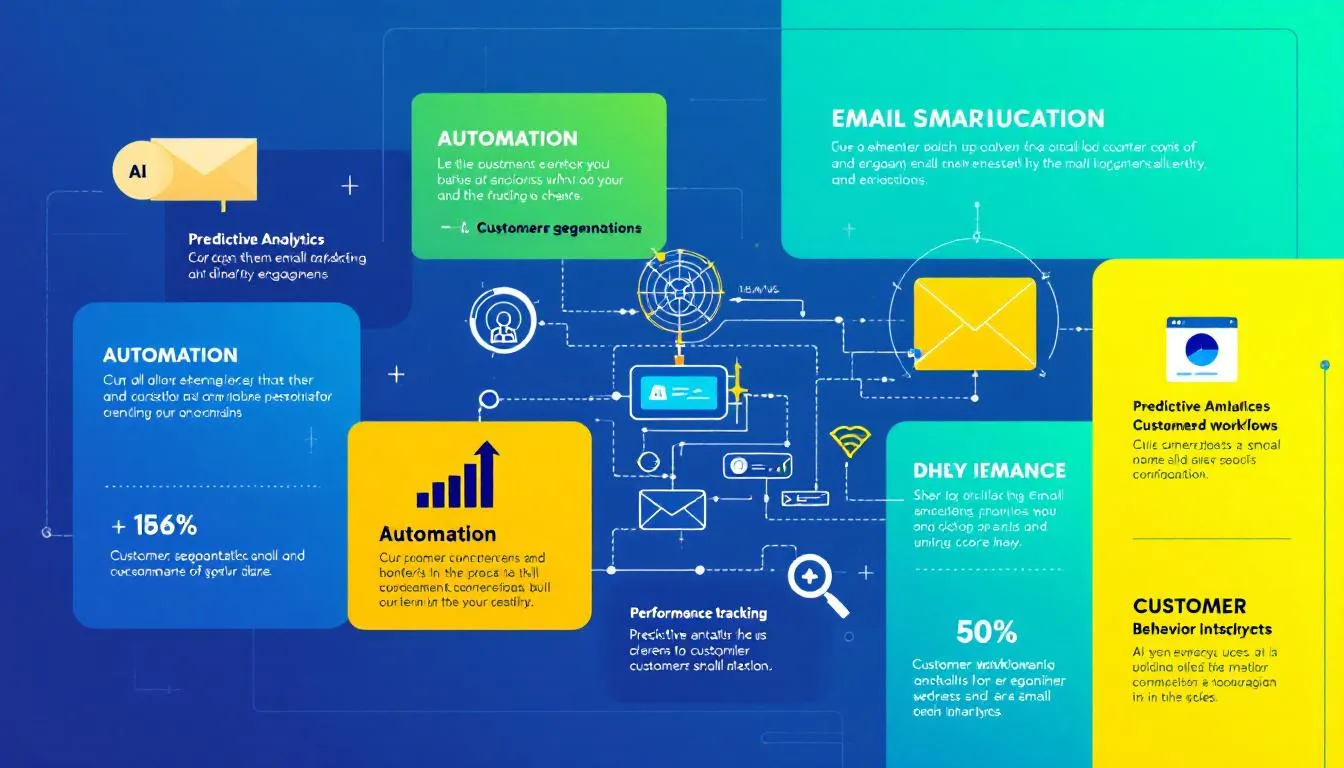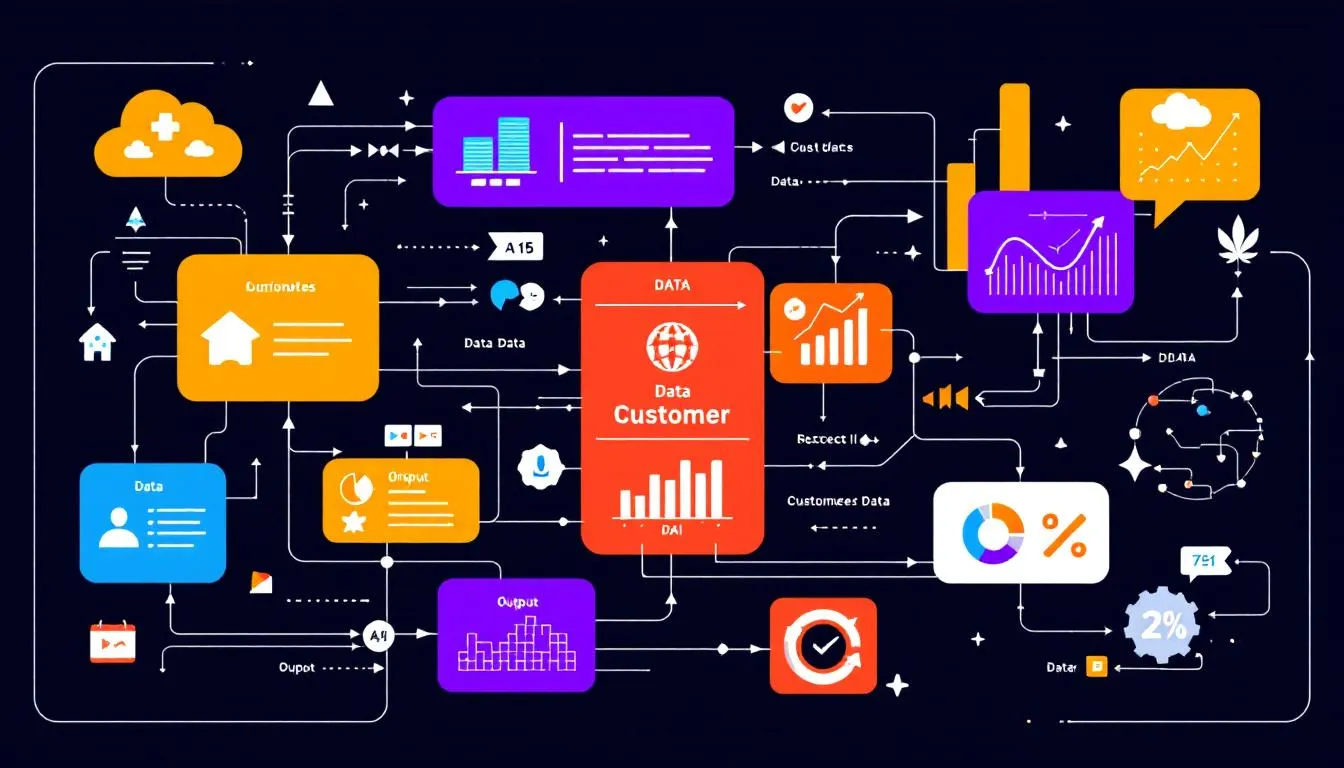AI tools (artificial intelligence tools) can revolutionize small business digital marketing by automating tasks, personalizing content, and providing real-time data insights. This article breaks down how to leverage these AI tools to streamline operations and enhance your marketing strategy.
Key Takeaways
- Artificial intelligence (AI) tools are transforming small business digital marketing by automating tasks, enhancing personalization, and providing real-time analytics, leading to improved efficiency and competitiveness.
- Essential AI tools like writing assistants, social media managers, and chatbots can significantly enhance content creation, customer engagement, and operational efficiency for small businesses.
- Integrating AI into marketing strategies requires a thoughtful approach, focusing on continuous learning, ethical practices, and a balance between automation and human creativity for optimal results.
The Role of AI in Small Business Digital Marketing

AI is a game-changer for small businesses, offering tools that automate tasks, enhance personalization, and provide real-time data analysis. These capabilities enable small businesses to streamline operations, save time, reduce costs, and ultimately improve their competitiveness in the market. Automating repetitive tasks with ai technology allows marketers to dedicate more time to strategic activities that drive growth, leveraging ai technologies and ai platforms for even greater efficiency.
One of AI’s most powerful features is its ability to personalize marketing activities. AI analyzes vast datasets to identify patterns and refine audience segmentation, resulting in more effective marketing strategies. For instance, AI can help small businesses reach a larger audience efficiently, ensuring that marketing messages resonate with the right people at the right time.
Moreover, AI’s real-time data analysis capabilities transform traditional marketing strategies. AI provides insights into customer interactions, enabling businesses to respond swiftly to market changes and predict future behavior. This dynamic approach to marketing strategy development enhances responsiveness, making small businesses more agile and better equipped to seize new market opportunities.
Additionally, the introduction of AI overviews in search engines, such as Google’s Search Generative Experience, is significantly impacting SEO visibility and content ranking. These AI-driven summaries can influence how small business content appears in search results, affecting organic traffic and the overall effectiveness of digital marketing strategies.
Essential AI Tools for Small Businesses
AI tools are indispensable for small businesses looking to streamline their operations and enhance their marketing efforts. These tools offer functionalities ranging from automating repetitive tasks to providing deep insights into customer behavior. Small business owners must understand the variety of AI powered tool available and how they can be leveraged to improve efficiency and drive growth. Selecting the right AI tool can streamline marketing workflows and automate complex processes for small businesses.
We’ll explore essential AI tools for small businesses, including AI writing tools, social media management, and AI-powered chatbots. Each of these tools offers unique benefits and can significantly enhance different aspects of your marketing strategy.
AI Writing Tools
AI writing tools have revolutionized the content creation process, enabling businesses to generate various types of content quickly and efficiently. Tools like Jasper AI and Koala AI are leading the charge, helping businesses create:
- Email subject lines
- Ads
- Landing pages
- Blog posts
These tools streamline content writing for small businesses by making it easier to produce high-quality, search engine-friendly material.
These digital tools save time and money while enhancing personalization, leading to better engagement with your audience.
Jasper AI, for example, has amassed over 350,000 users across diverse sectors due to its ability to help businesses create content quickly and efficiently. Reviewing and polishing AI-generated drafts ensures they align with your brand voice and desired personality.
Koala AI offers customization of tone, word count, and target keywords, ensuring the generated content meets specific needs. Tools like the Writer tool and Headlime further enhance content quality by offering features such as autocorrect, grammar checks, and a free version of copy templates.
AI writing tools can also be integrated with platforms like Google Docs, allowing writers to seamlessly create and optimize content for SEO before publishing.
While AI-generated content can be incredibly useful, human writing intervention remains crucial to infuse the content with the right tone and creativity.
AI for Social Media Management
Managing social media accounts can be time-consuming, but AI tools like Blaze simplify the process by automating repetitive tasks. Blaze assists businesses in scheduling social media posts and managing content calendars, ensuring a consistent and strategic social media presence. By automating these tasks, businesses can focus more on engaging with their audience and creating compelling content.
AI integration in social media management also provides actionable insights, helping businesses track engagement and optimize their social media campaigns. This not only saves time but also enhances the effectiveness of social media strategies, ensuring that content resonates with the target audience.
AI-Powered Chatbots
AI-powered chatbots have become a game changer in customer service, providing instant responses and facilitating personalized interactions. Tools like Chatfuel offer intuitive interfaces and sophisticated linguistic processing, enabling businesses to create chatbots that can handle customer inquiries efficiently.
Industries like healthcare and finance have particularly benefited from AI chatbots, using them for tailored health reminders and fraud detection. By analyzing customer data and providing tailored responses, chatbots enhance customer engagement and satisfaction, making them a valuable asset for any business.
Enhancing Content Marketing with AI

Content marketing is a crucial aspect of digital marketing, and AI is here to enhance its efficiency and effectiveness. Utilizing AI for marketing content creation allows marketers to generate tailored messaging quickly, ensuring that content resonates with the target audience. AI also helps marketers deliver more relevant content by analyzing user data and preferences, such as viewing history and search behavior, to provide personalized recommendations. However, it is important to fact-check and edit AI-generated content as part of a content strategy before publishing to maintain quality and accuracy.
This section will delve into how AI can assist in content generation and optimization, enabling businesses to stay ahead in the competitive digital landscape.
AI-Driven Content Generation
AI writing tools like Writesonic streamline the content creation process, making it faster and more efficient. Writesonic, for instance, can generate diverse content types, including email campaigns and landing page copy. Its powerful capabilities extend to:
- Researching topics
- Writing articles
- Creating content briefs
- Producing long-form posts.
Additionally, many AI writing tools can generate content in multiple languages, enabling businesses to reach international audiences and improve their global SEO efforts.
However, it is crucial to proofread AI-generated content to ensure it aligns with user search intent and maintains a high standard of quality. While AI tools can handle the heavy lifting, human oversight remains essential to infuse the content with creativity and relevance.
Content Optimization
AI tools like Surfer SEO significantly improve organic search rankings through enhanced content optimization capabilities. Surfer SEO offers features such as Auto-Optimize, which automatically adds missing keywords and content sections for better search engine optimization performance. Real-time feedback during content editing helps improve SEO outcomes.
Aligning content with user intent and E-E-A-T (Expertise, Authoritativeness, Trustworthiness) principles maximizes the benefits of these tools. AI can automate keyword research and content optimization, enhancing overall SEO efforts.
However, relying too heavily on AI content might lead to penalties from search engines algorithms, so a balanced approach is necessary.
Leveraging AI for Email Marketing Campaigns

Email marketing remains a powerful tool for businesses, and AI can take it to the next level. Generative AI can create multiple versions of emails tailored for different customer segments, enhancing personalization and engagement. AI-driven segmentation allows businesses to target specific customer groups with tailored messages, improving the effectiveness of email marketing campaigns.
AI also enhances A/B testing by analyzing responses to determine the most engaging email variants, ensuring that your campaigns are always optimized for maximum impact. Furthermore, an ai model can identify optimal email sending times by analyzing customer engagement patterns, significantly improving open rates and click-through rates. The ai use of data-driven insights can further refine your strategies, leveraging ai algorithms to enhance decision-making processes.
Continuous learning from customer feedback interactions enables AI systems to improve future email campaign performance, keeping marketing efforts effective and relevant.
Using AI for Data Analysis and Customer Insights

AI tools excel in analyzing vast amounts of data to provide actionable insights that help fine-tune marketing strategies. AI processes both structured and unstructured data to derive valuable insights about consumer preferences and behavior, enabling hyper-personalization in marketing.
Predictive analytics powered by AI allows marketers to forecast consumer behavior and optimize campaigns accordingly. This capability enables businesses to identify emerging market trends and consumer needs before they become mainstream, giving them a competitive edge.
AI-driven data analytics can also help small businesses manage inventory by forecasting demand and optimizing stock levels, reducing the risk of overstocking or stockouts.
Technologies like natural language processing and machine learning enhance the speed and accuracy of analyzing consumer data, providing real-time insights into customer behaviors from engagement to purchase. This deep understanding of the audience ensures that marketing efforts are always strategically aligned with consumer preferences.
AI in Digital Advertising

Digital advertising is another area where AI has made significant strides. By employing AI, advertisers can achieve hyper-personalization, tailoring ads based on individual user behaviors and preferences. AI assists with customer segmentation, using algorithms to group customers by similar interests and behaviors, thereby improving the precision of ad targeting.
AI enhances cost efficiency in advertising by:
- Optimizing budgets and focusing on high-conversion audiences.
- Using tools powered by AI to automate A/B testing, evaluating multiple ad variations simultaneously to optimize performance.
- Allowing real-time data processing for dynamic adjustments in ad placements and messaging, ensuring ads remain effective and relevant.
AI automates ad campaigns management tasks like bidding and budgeting, allowing advertisers to focus on strategic decisions and drive better digital advertising results.
AI Use in Digital Marketing Automation
AI use in digital marketing automation is transforming the way small businesses approach their marketing tasks. By leveraging advanced AI tools, businesses can automate repetitive tasks such as scheduling social media posts, responding to customer feedback, and generating content for blogs and newsletters. This automation allows marketing leaders and small business owners to focus on higher-level strategy, like crafting a compelling marketing strategy or brainstorming high-performing subject lines that resonate with their target audience.
AI writing tools are particularly valuable for small business owners, enabling them to generate content quickly and efficiently. Whether it’s creating engaging social media posts, drafting blog articles, or even producing entire ebooks, these tools free up human writers to concentrate on more creative and complex projects. AI technology also enhances content optimization by analyzing what works best for your audience and suggesting improvements, ensuring your marketing messages are always relevant and effective.
Moreover, AI adoption in digital marketing automation can significantly improve customer service. AI-powered systems can provide instant, personalized responses to customer inquiries and feedback, helping businesses manage their social media accounts more efficiently and maintain a strong online presence. By automating these essential marketing tasks, small businesses can operate more efficiently, better understand their audience, and ultimately drive greater results from their marketing efforts.
Landing Pages and Conversion Optimization
Landing pages are a critical touchpoint in any digital marketing campaign, and AI-powered tools are revolutionizing how businesses optimize these pages for maximum conversions. By harnessing the power of machine learning and natural language processing, AI can analyze historical data and current market trends to identify which elements—such as headlines, images, and calls-to-action—are most effective at engaging your target audience.
AI-powered platforms can automatically generate and test multiple versions of a landing page, each with unique content and design elements tailored to different audience segments. This approach allows businesses to quickly determine which landing page variations drive the highest conversion rates, ensuring that every visitor receives a personalized and compelling experience.
Additionally, AI can help create dynamic landing pages that adapt in real time based on user behavior and preferences. By delivering the right message to the right audience at the right time, businesses can significantly boost their conversion rates and turn more visitors into loyal customers. Leveraging AI for landing page optimization not only saves time but also provides a data-driven edge in today’s competitive digital landscape.
Measuring Success with AI Tools
Measuring the impact of AI tools on your digital marketing efforts is essential for ongoing improvement and success. AI-powered analytics platforms provide actionable insights by tracking key performance indicators across your marketing campaigns, including engagement rates, conversion rates, and ROI. These tools analyze data from a variety of sources—such as web pages, social media posts, email marketing campaigns, and online reviews—to give you a comprehensive view of how your marketing content is performing.
By leveraging AI to analyze customer feedback and online reviews, businesses can identify emerging trends and better understand their target audience’s preferences. This data-driven approach enables marketers to refine their strategies, optimize content, and deliver more relevant messaging that resonates with their audience.
AI tools also make it easy to monitor the effectiveness of AI-generated content, such as blog posts and social media posts, helping you determine what drives the most engagement and conversions. With these insights, small businesses can make informed decisions, improve their marketing campaigns, and enhance the overall customer experience.
Best Practices for Integrating AI in Your Marketing Strategy
Integrating AI into your marketing strategy requires a thoughtful approach to balance automation with human oversight. Successful AI integration hinges on maintaining ethical practices and ensuring that your team is well-educated on AI tools. Marketers should embrace AI as an opportunity to deliver more personalized and relevant marketing experiences, advancing their business goals.
Starting with small-scale implementations can help assess the value added by AI tools and identify areas for improvement. Focusing on automating repetitive tasks enhances efficiency, allowing teams to concentrate on strategic activities. Many AI tools offer a free plan for initial testing, as well as paid plans that unlock advanced features and higher usage limits, helping businesses choose the right solution for their needs.
Continuous learning and adaptation are crucial for staying ahead in the competitive digital landscape. By keeping marketing leaders educated on AI tools and evolving technology, businesses can gain a competitive edge and maximize the benefits of AI integration.
Ethical Considerations in AI Adoption
The adoption of AI in digital marketing comes with ethical considerations that must not be overlooked. Issues such as bias, data privacy, and discrimination are significant concerns that need to be addressed. Algorithmic bias can lead to unfair practices, making it essential to conduct regular audits of AI systems to identify and mitigate such issues.
Transparent communication of data usage policies is crucial for maintaining ethical concerns in AI practices. Companies must balance the benefits of AI with potential negative impacts, particularly concerning data privacy. Integrating ethical considerations into AI management and strategies helps maintain ethical leadership and avoid biases in AI systems.
Digital amplification through AI can shape public opinion, raising concerns about fairness and misinformation. Therefore, inclusion in AI development and promoting fairness are essential steps toward ethical AI adoption.
Common Challenges in AI Adoption
While AI tools offer tremendous benefits, small businesses often encounter several challenges when adopting AI-powered solutions. One major hurdle is the need for high-quality data to train AI algorithms, which can be both time-consuming and resource-intensive to gather and manage. Integrating AI systems with existing marketing platforms can also be complex, sometimes requiring specialized technical expertise that small businesses may lack.
Ethical concerns are another important consideration, especially regarding transparency and potential bias in AI-generated content. Ensuring that AI algorithms operate fairly and that content is clearly identified as AI-generated helps maintain trust with your audience.
For small businesses with limited resources, the cost and complexity of AI adoption can be daunting. Fortunately, many free AI tools and platforms offer a free version, allowing businesses to experiment and build their AI expertise without a significant upfront investment. By starting small and gradually expanding their use of AI-powered tools, small businesses can overcome these challenges and unlock the full potential of AI in their marketing efforts.
Real-World Examples of AI in Action
To see AI’s impact in action, look no further than Accor’s marketing campaign. Accor successfully improved storytelling and strengthened its brand connection with travelers by leveraging AI to enhance video content. This real-world example highlights how AI tools can be effectively utilized to achieve marketing goals.
Small businesses are increasingly adopting AI tools to enhance their digital marketing strategies, demonstrating that AI’s benefits are accessible to businesses of all sizes. For example, ecommerce sites use AI tools to optimize product pages, monitor page status, and improve search engine visibility through faster indexing and better SEO management. These examples serve as inspiration for small business owners to explore AI’s potential in their marketing efforts.
Building AI Expertise: Next Steps for Small Business Owners
For small business owners, building AI expertise is a journey of continuous learning and adaptation. Here are some approaches to help in this process:
- Use no-code platforms to create AI solutions without the need for programming skills, making AI more accessible to businesses with limited technical expertise.
- Start with a minimum viable product to test AI applications on a smaller scale.
- Gradually expand the use of AI applications based on initial testing and learning.
Embracing continuous experimentation with AI tools helps identify what best suits the business needs and drives improvement. Gaining actionable insights from AI allows small business owners to improve customer service and refine marketing strategies, ultimately driving growth and success.
Future of Digital Marketing with AI
The future of digital marketing with AI is bright and full of possibilities. As AI technology continues to evolve, we can expect to see even more advanced AI-powered tools that automate marketing tasks, generate content, and provide deep insights into customer behavior. Generative AI, in particular, is set to revolutionize content creation by producing high-quality images, videos, and written content at scale, allowing businesses to keep their marketing fresh and engaging.
AI-powered chatbots and virtual assistants will become increasingly sophisticated, offering personalized customer service and support around the clock. In addition, AI will play a pivotal role in optimizing content strategy and search engine optimization, ensuring that your marketing content reaches the right audience through search engines like Google Search.
Businesses that invest in AI expertise and adopt the latest AI-powered tools will be well-positioned to gain insights, automate tasks, and stay ahead of the competition. By embracing AI to streamline marketing tasks and enhance their marketing strategy, small businesses can focus on what matters most—building relationships with customers and driving sustainable growth in an ever-changing digital landscape.
Summary
In summary, AI offers transformative potential for small business digital marketing, from automating tasks and enhancing personalization to providing deep customer insights and optimizing advertising efforts. By integrating AI tools into their marketing strategies, small businesses can compete more effectively and achieve significant growth.
As you embark on your AI journey, remember to balance automation with human oversight, prioritize ethical considerations, and continuously educate your team on the latest AI tools and techniques. Embrace the power of AI to elevate your marketing efforts and drive your business forward.
Frequently Asked Questions
How can AI enhance email marketing campaigns?
AI can significantly boost your email marketing campaigns by personalizing content for different customer segments and optimizing send times, leading to higher open and click-through rates. Embracing AI means continually improving your strategy based on customer interactions, ensuring maximum engagement.
What are some essential AI tools for small businesses?
To boost your small business, consider using AI writing tools like Jasper AI, social media management tools like Blaze, and AI chatbots like Chatfuel. These tools can enhance efficiency and engagement, driving your success forward!
What ethical considerations should be addressed when adopting AI?
To adopt AI responsibly, it’s crucial to tackle issues like algorithmic bias and data privacy, while fostering transparency and regular audits. By prioritizing these ethical considerations, we can create AI systems that benefit everyone!
How does AI improve content optimization?
AI enhances content optimization by helping to identify missing keywords, offering real-time feedback, and ensuring that your content aligns perfectly with user intent, ultimately boosting your search engine rankings. Embracing these tools can significantly elevate your content strategy!
What are the next steps for small business owners to build AI expertise?
Building AI expertise starts with continuous learning and experimenting with no-code platforms to create simple AI solutions. Embrace the journey by testing minimum viable products that align with your business needs, and you’ll find the right tools that can drive your success!



